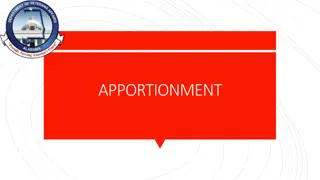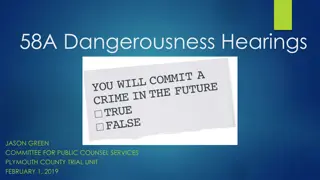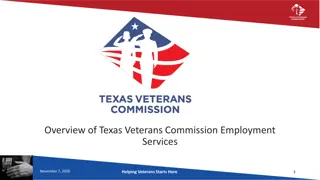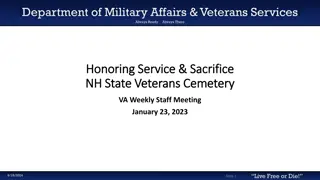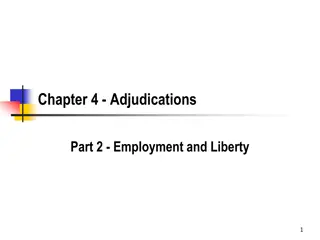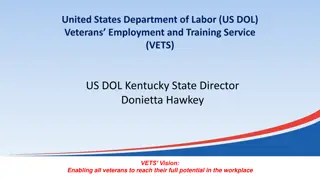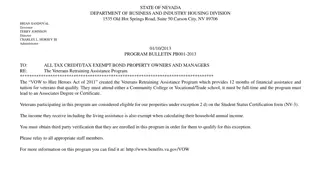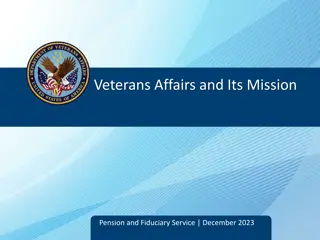Guide to Preparing Veterans for Hearings
This segment provides insights on preparing veterans for in-person hearings during the appeals process. It covers types of hearings, the role of Decision Review Officers (DRO) and Board of Veterans Appeals (BVA), and how to assist veterans in understanding the reasons for denial and choosing the right path for their appeal. Practical tips and strategies are highlighted to help veterans navigate the appeals process effectively.
Download Presentation

Please find below an Image/Link to download the presentation.
The content on the website is provided AS IS for your information and personal use only. It may not be sold, licensed, or shared on other websites without obtaining consent from the author.If you encounter any issues during the download, it is possible that the publisher has removed the file from their server.
You are allowed to download the files provided on this website for personal or commercial use, subject to the condition that they are used lawfully. All files are the property of their respective owners.
The content on the website is provided AS IS for your information and personal use only. It may not be sold, licensed, or shared on other websites without obtaining consent from the author.
E N D
Presentation Transcript
NOTE No references required The appeals process is discussed in detail in another section. This segment is designed to help you convey how the hearing process works and what you can do to help your veterans be as prepared as possible for in-person hearings.
TYPES OF HEARINGS When a veteran is appealing a denial, they may elect one of two types of hearings, a Decision Review Officer (DRO) hearing or a Board of Veterans Appeals (BVA) hearing - with variations of both. Decision Review Officer (or other V.A. official). In a DRO hearing, veterans may elect a: Higher Level Review, which means the DRO will decide the claim with the evidence currently on hand. No new evidence is allowed. Only use this avenue of appeal if you feel the V.A. just made an obvious mistake that we can point out to them. Supplemental Claim is a DRO hearing in which new evidence is allowed. Use this avenue if there is new, substantial evidence that was not on the record when the original decision was made.
TYPES OF HEARINGS BVA hearings are with a federal judge who is not employed by the V.A. Choose this avenue if there are more complex issues that may need to be explained. The V.A. tends to see issues in black or white. Either the evidence is there to grant or it s not. The BVA has the authority and ability to see the shades of gray that could turn a denial into a grant.
YOUR PART IN HEARINGS Help them understand why the claim(s) were denied. 99.9% of denials happen because the claim is missing one or more elements of the Rule of Three. Read the denial narrative with them and point out what is missing. If the veteran can get what is missing, they can choose a supplemental claim and avoid a hearing altogether. If the veteran cannot satisfy the Rule of Three, it is your job to gently let them know that they are not going to win. A large part of the appeals back log are claims that never should have been made, let alone appealed. Some will insist on continuing - document in VetraSpec that you tried to tell them.
YOUR PART IN HEARINGS If a hearing is the way to go, it s your responsibility to help them choose the right path, educating them on their DRO or BVA options. Keep in mind, if you feel the claim has merit and it s been previously denied, a BVA path would probably be a better choice.
YOUR PART IN HEARINGS A DOCKET DATE Veterans will come to you and inform you that they have received a hearing date and time. It is possible that this is the first time you have met this veteran. Again, go over the narrative and point out what is missing. If they do not have a current diagnosis, urge them to get one before the hearing. If they have no record of in-service complaints, urge them to get lay statements, photos, or anything that can help prove the rule. If they are missing a nexus, again urge them to get one from an examiner.
EVIDENCE If your veteran is able to secure opinions or new evidence, put it in VetraSpec or just submit it to VBMS. Make sure you write good VetraSpec notes so the veteran s hearing representative understands that new evidence exists and knows where to find it. Ensure that they understand anything FROM the V.A. (correspondence, medical records, etc.) is NOT new evidence. This information is already of record. Turning it in again just duplicates records and adds confusion to what the hearing representative is trying to accomplish.
YOUR PART IN HEARINGS A DOCKET DATE Put them at ease. Many veterans hear BVA hearing with a federal judge and envision scenes from the television show Law & Order. It s just not like that. Hearing are non-adversarial, meaning nobody is going to cross-examine the veteran or try to trip up their testimony. BVA video hearings have the judge via teleconference. The equipment is state of the art and feels like the judge is there with you. Hearings are basically a conversation between the veteran, their ADVA representative, and the DRO or judge. The officials, especially judges, are trying their best to grant issues. The hearing is our opportunity to give them the information and evidence they need to do that. If we cannot give them the needed evidence, that is NOT the judge s fault. Inform them that they will not get a decision at the end of the hearing.
AFTER THE HEARING The wheels of justice move slowly very slowly in the hearing process. Help veterans understand: Traditionally, veterans can wait a year or more for a decision. After a BVA hearing, the claim is with the BVA in Washington D.C. They have their own tracking system that we do not have access to. While the case is with them, we have no way to provide status or progress updates. Veterans, however, can call the BVA customer service line at 1- 800-823-8387.
APPEALS AND NEW CLAIMS A final thought on appeals: Making new claims that may be related to issues on appeal can complicate matters and slow both processes. For instance, a veteran is appealing a back issue and makes a new claim for IU. The V.A. feels the back issue has an impact on the IU claim and stops the process until the appeal is settled.
SUMMARY You can be the deciding factor in winning an appeal at any level. Help veterans understand the right path to choose and why. Make them understand what evidence is needed to win and urge them to get it. Help them understand how the hearing works so that they are not nervous. Help them understand that it can be long-term process and they need to have patience.




